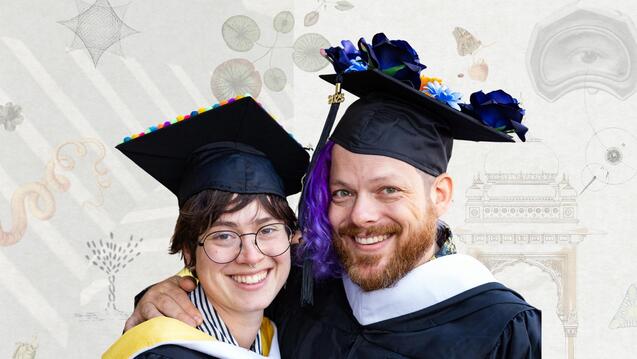
Master of Arts in Philosophy and Religion
Master of Arts in Philosophy and Religion with a concentration in Philosophy, Cosmology, and Consciousness
Program Overview
Our Approach
CIIS’ master’s in Philosophy, Cosmology, and Consciousness has been designed to help shape the intellectual, moral, and spiritual leadership necessary for meeting historic global challenges.
Drawing upon some of the most powerful ideas and impulses of our philosophical, scientific, and religious traditions, our faculty has constructed an intensive multidisciplinary course of study to help accelerate students' journeys into their leadership roles.
Students focusing on Integral Ecology will learn to address the ecological crisis in a way that integrates nature and culture, facts and values, and science and spirituality. The curriculum supports scholar-activists committed to eco-social justice and the ideal of a flourishing Earth community.
Along with the standard weekly classes, the learning experience unfolds in a variety of settings and contexts, from the annual retreat for students, faculty, and alumni at Esalen Institute and community social gatherings at the start of each semester, to the regular forums, symposia, and program-sponsored conferences.
Career Paths
The master’s degree in Philosophy, Cosmology, and Consciousness prepares students to think critically and constructively about key philosophical challenges, questions, and issues of our time. As a transdisciplinary program, our graduates pursue a wide variety of philosophical, ecological, and humanitarian paths, projects, and vocations. Alumni of the program are actively involved in diverse professional areas, such as:
- Teaching and writing for a variety of audiences (e.g., public, academic, professional)
- Leading and facilitating programs for cultural, spiritual, and personal transformation
- Creating, producing, and developing new media and engaged arts projects
- Reimagining and renewing a variety of professional fields (e.g., education, religion, medicine, technology, the arts, finance)
Curriculum
The master’s in Philosophy, Cosmology, and Consciousness at CIIS consists of 36 semester units, and is offered in both online and residential format. Online students are highly encouraged but not required to participate in the annual residential retreat, intensive courses, and other program-associated events held in and around the San Francisco Bay Area.
Students can pursue one of two options, the Philosophy, Cosmology, and Consciousness track which incorporates an expanded vision of contemporary philosophical, psychological, and natural sciences or the Integral Ecology Track, in which students study the complex character of the Earth community, the factors that threaten it, and possibilities for a better way forward.
At the conclusion of their master’s program, all students take an integrative seminar which is structured to help consolidate what they have learned throughout the program. Through a process of collaborative inquiry, students refine their unique perspectives and their ability to bridge various bodies of knowledge while developing plans for their next steps after graduation. The course culminates with a public presentation to the assembled Philosophy, Cosmology, and Consciousness community of the students’ key insights.
Curriculum Highlights
PARP 6522 Science, Ecology, and Contested Knowledge (3 units) To understand the current ecological crisis, we need to investigate the ontological and epistemological foundations of our knowledge about the environment. The science of ecology, in its social and biophysical permutations, is a dominant way of understanding the natural environment. Examining the social construction of scientific and ecological knowledge will shed light on how we know and what we know about the natural environment. In this course, we will critically examine the social construction of scientific and ecological knowledge, coming to see Western scientific knowledge as a particular cultural phenomenon. We will examine countervailing epistemological understandings, such as situated knowledge and traditional ecological knowledge, that challenge the idea of a dispassionate and omniscient scientific viewpoint. We will investigate the compatibility of religious and spiritual insights with ecological knowledge. Applying feminist and non-Western epistemologies to environmental issues, we will seek to generate alternative ways of understanding ecological crises, which may, in turn, generate healing alternatives.
PARP 6134 Process Approaches to Consciousness (3 units) This is a course on consciousness. In one sense, consciousness is a subject we are each intimately familiar with. What could be more obvious than the fact that we think, feel, sense, and imagine things? But in another sense, consciousness remains a hotly contested object of academic study, with some claiming it does not exist at all and others claiming it is the only thing that does! This course examines the subject/object of consciousness from a plurality of disciplinary perspectives, including theoretical biology, neuroscience, psychology, transpersonal theory, philosophy of mind, cognitive science, phenomenology, psychedelic studies, and especially process philosophy. Alfred North Whitehead’s process-relational panexperientialism is explored as a potential naturalistic alternative both to deflationary accounts of consciousness offered by scientific materialism and to more inflationary accounts offered by philosophical idealism.
PARP 6150 The Book of Nature (3 units) Can the ancient metaphor of “the book of nature” provide us with theoretical and imaginative tools for a critique of the current crisis of nature and culture? Increasingly, many see our current crisis crystallized in the apparent conflict between a humanism that ignores nature, on the one hand, and a naturalism that warps and disfigures our understanding of humanity, on the other. Can we look at things differently? This course seeks to respond to the prevailing crisis through a critical reconsideration of the metaphor of the book of nature, one of the central root metaphors for relating nature and culture throughout Western history. We will follow the development of this trope from its appearance in antiquity through to its high point of cultural influence in the Middle Ages, its transformation in early modern science and philosophy, and its continuing importance for much Romantic and environmental literature. Along the way, we will also consider the role of the imagination in the mediation of knowledge, the relationship between allegory and metaphysics, and the connection between dominant metaphors and the modes of consciousness attaching to them.
-
I. Required Introduction Course (3 units)
PARP 6060 Introduction to Philosophy, Cosmology, and Consciousness
II. Philosophy, Cosmology, and Consciousness Electives (18 units)
The following are representative courses. Course options will vary year to year.
PARP 6110 Cosmological Powers
PARP 6120 Cosmology of Literature
PARP 6131 Speculation and Adoration: Introduction to the Study of Medieval Christian Mysticism
PARP 6133 Whitehead’s Adventure in Cosmology: Toward a Physics of the World-Soul
PARP 6134 Process Approaches to Consciousness
PARP 6135 Process and Difference in the Pluriverse
PPARP 6143 The Red Books of C.G. Jung and J.R.R. Tolkien: An Archetypal Perspective
PARP 6249 Romanticism and Philosophy
PARP 6275 Plato and Platonism
PARP 6278 Integral Ecologies
PARP 6315 Epic of the Universe
PARP 6393 Mind and Nature in German Idealism
PARP 6403 Spirit and Nature
PARP 6407 Biography and Karma
PARP 6422 Aurobindo, Steiner, and Teilhard
PARP 6431 Martin Luther King Jr.: Justice, Cosmology, and Interconnection
PARP 6506 The Great Turning
PARP 6517 History of Western Thought and Culture: An Archetypal Perspective
PARP 6522 Science, Ecology, and Contested Knowledge(s)
PARP 6525 Toward an Integral Ecological Consciousness
PARP 6532 Christianity and Ecology
PARP 6533 Touch the Earth: Integral Ecology Practicum
PARP 6538 Krishna, Buddha, and Christ
PARP 6563 Buddhism and Ecology
PARP 6650 Advanced Seminar: A.N. Whitehead’s Process and Reality
PARP 6667 Radical Mythospeculation: Cosmic Evolution and Deep History
PARP 6743 Cosmology of Food I
PARP 6744 Cosmology of Food II
PARP 6746 The Earth Journey
PARP 6748 Nature and Eros
PARP 6762 Steiner and Jung
PARP 6822 Hegel, Wilber, and Morin: Foundations of Integral Theory
PARP 6829 Integral T’ai Chi
PARP 6833 The Evolution of Religious Consciousness: From the Paleolithic to the Axial Age
PARP 6834 The Evolution of the Modern Self: From Axial Roots to Postmodern Threshold
PARP 6842 Cosmological Epics
PARP 7001 Psyche and Cosmos I: Transpersonal Psychology and Archetypal Astrology
PARP 7002 Psyche and Cosmos II: Transits in Depth (Practicum)
PARP 7007 American Philosophy
PARP 7008 James Hillman and Archetypal Psychology: An Introduction
PARP 7105 Archetypes, Art, and Culture
PARP 7400 Psyche and Spirit: From the Psychology of Religion to Transpersonal Theory
IV. General Electives (12 units)
Student chooses 12 units from any CIIS program.
V. Culminating Coursework (3 units)
PARP 6897 Integrative Seminar
-
This track requires 36 units including 3 units of Integral Ecology Practicum.
I. Required Courses (6 units)
PARP 6060 Introduction to Philosophy, Cosmology, and Consciousness
PARP 6278 Integral Ecologies
OR
PARP 6525 Toward an Integral Ecological Consciousness
II. Philosophy, Cosmology, and Consciousness Electives (6 units)
Student chooses 6 units from the Philosophy, Cosmology, and Consciousness Elective elective list.
III. Integral Ecology Electives (6 units)
The following are representative courses. Course options will vary year to year.
PAR 6078 Theory and Method in the Integrative Study of Religion and Ecology
PAR 6079 Ecology in a Time of Planetary Crisis
PAR 6292 Next of Kin
PARP 6110 Cosmological Powers
PARP 6120 Cosmology of Literature
PARP 6150 The Book of Nature
PARP 6159 Plants and People: Understanding the Plant World Through Relationships
PARP 6278 Integral Ecologies
PARP 6315 Epic of the Universe
PARP 6393 Mind and Nature in German Idealism
PARP 6403 Spirit and Nature
PARP 6431 Martin Luther King Jr.: Justice, Cosmology, and Interconnection
PARP 6506 The Great Turning PARP 6522 Science, Ecology, and Contested Knowledge(s)
PARP 6525 Toward an Integral Ecological Consciousness
PARP 6532 Christianity and Ecology
PARP 6533 Touch the Earth: Integral Ecology Practicum
PARP 6563 Buddhism and Ecology
PARP 6743 Cosmology of Food
PARP 6744 Cosmology of Food II
PARP 6746 The Earth Journey
PARP 6748 Nature and Eros
PARP 6822 Hegel, Wilber, and Morin: Foundations of Integral Theory
IV. General Electives (12 units)
Student chooses 12 units from any CIIS program.
V. Integral Ecology Practicum (3 units)
PARP 6533 Touch the Earth: Integral Ecology Practicum. This course combines a semester-long Integral Ecology fieldwork experience of the student’s own choosing with a discussion seminar.
VI. Culminating Coursework (3 units)
PARP 6897 Integrative Seminar
VII. Optional Thesis Adviser, approval required (0.2 units)
PARP 9800 Thesis/Dissertation Proposal Completion
PARP 9900 Thesis/Dissertation Seminar
Entry Requirements
If you would like to learn more about this program, we’re here to help. Explore our program further with in-depth materials, discuss your personal and career goals at one of our open houses, or get in touch with our admissions counselors, who are ready to assist you in navigating the application process.
Required Application Materials
Your application is your opportunity to share who you are. To be considered essays and written responses must be your own authentic work.
Online Admissions Application: Begin the application process by submitting an online application and paying the nonrefundable $68 application fee.
Degree Requirement: An undergraduate degree (B.A., B.S., or the equivalent) from a regionally accredited institution.
Minimum GPA: A GPA of 3.0 or higher in previous coursework is required. However, a GPA below 3.0 does not automatically disqualify an applicant and CIIS will consider a prospective student whose GPA is between 2.0 and 3.0. These individuals are required to submit a GPA Statement and are encouraged to contact the Office of Admissions to discuss their options.
Transcripts: Official transcripts from all accredited academic institutions attended where 7 or more credits have been earned. Transcripts may be sent digitally to materials@ciis.edu or mailed to CIIS in their official, sealed envelope. Transcripts from institutions outside the U.S. or Canada require a foreign credit evaluation through World Education Services (WES). CIIS will also accept foreign credential evaluations that are in a comprehensive course-by-course format from the current members of the National Association of Credential Evaluation Services (NACES).
Personal Statement: A four-to-six-page (typed, double-spaced) statement of your educational and professional objectives, including any significant biographical events that directly influenced your decision to apply to this program. The personal statement should also articulate what you hope to gain from your time in the program and, if appropriate, how your time in the program relates to your long-term personal and professional aspirations.
Academic Writing Sample: A writing sample of five-to-fifteen (typed, double-spaced) pages that demonstrates your capacity to think critically and reflectively and demonstrates graduate level writing abilities. A sample that uses outside sources must include proper citations. You may submit copies of previous work, such as a recent academic paper, article, or report that reflects scholarly abilities.
One Letter of Recommendation: Letters of recommendation should ideally be from professors who can attest to your scholarly writing and research abilities. Recommenders should use standard business format and include full contact information (name, email, phone number, and mailing address).
Events and Info Sessions
An online event with Admissions Counselors Skylar Hall and Ronda Sharp
Attend our in-person event on January 31 or online event on February 21.
An Online Overview with Jennifer Gruczelak and Ronda Sharp



Take the Next Step
For over 50 years, CIIS has been at the forefront of education that integrates rigorous science, innovative scholarship, and social justice. You will learn from faculty at the forefront of their fields, local artists and activists, and a community of peers as passionate and dedicated as you. There’s never been a better time to be here – let’s build a healthier and more equitable world.




